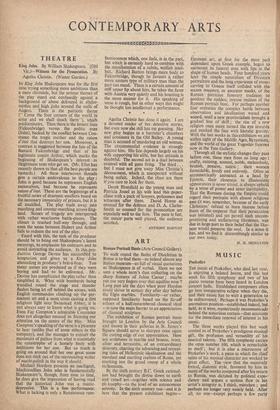CONTEMPORARY ARTS
THEATRE
King John. By William Shakespeare. (Old Vic.)—Witness for the Prosecution. By Agatha Christie. (Winter Garden.) IN King John Shakespeare was for the first time trying something more ambitious than a mere chronicle, but the serious themes of the play stand out confusedly against a background of abuse delivered in sticho- mythia and high jinks around the walls of Angers. There is the patriotic theme (" Come the four corners of the world in arms and we shall shock them"), which predominates. Then there is the honest man (Falconbridge) versus the politic man (John), backed by the conflict between Con- stance the tragic mother and the raison d'etat that destroys her son. Moreover, a contrast is suggested between the fate of the Bastard Falconbridge and that of his legitimate cousin Arthur, which marks the beginning of Shakespeare's interest in illegitimate sons who get on. (Mr. Eliot has recently shown us that all the best people are bastards.) All these interwoven threads give a certain ambivalence to the play : John is good because he represents English nationalism, bad because he represents raison d'etat. These are the beginnings of a fruitful series of dramatic conflicts based on the necessary immorality of princes, but it is all muddled. The play trails away into marching and counter-marching across Eng- land. Scenes of tragedy are interspersed with rather wearisome battle-pieces. The climax is reached half-way through, and even the scene between Hubert and Arthur fails to redeem the rest of the play.
• Faced with this, the task of the producer should be to bring out Shakespeare's latent meanings, to emphasise his contrasts and to avoid distracting the audience. In this pro- duction George Devine has succumbed to temptation and given us a King John abounding in producer's bric-i-brac. Too many scenes are produced as if they were boring and had to be enlivened. Mr. Devine has complicated the play rather than simplified it. What with bombards being trundled round the stage and thunder flashes being let off behind the scenes, with English commandos climbing up the per- manent set and a neon cross casting a dim religious light over Swinstead Abbey, it is not always easy to know what is going on. Even Fay Compton's admirable Constance does not altogether succeed in focusing our attention on the centre of the play. Miss Compton's speaking of the verse is a pleasure to hear (unlike that of some others in the company), and she manages to extract the maximum of pathos from what is essentially the catastrophe of a homely body with ambitions for her son. But so much is going on around that her one great scene does not stick out of the surrounding welter of macht-politik in the way it should.
Michael Hordem .presents an intelligent, Machiavellian John who is fundamentally. Shakespeare's, though, from time to time, he does give the impression of having read that the historical John was a manic- depressive. This is a fine performance. What is lacking is only a Renaissance rum-
bustiousness which, one feels, is in the part, but which is certainly hard to combine with the manifestation of a subtle, wolfish intel- lect. Richard Burton brings more body to Falconbridge, though he favours a rather more austere type of military man than the part can stand. There is a certain amount of stiff upper lip about him, he takes the farce with Austria very quietly and his boasting is the more sinister for it. His speaking of verse is rough, but in other ways this might be thought too intellectual a performance.
Agatha Christie has done it again. I am a devoted reader of her. detective stories, but even now she still has me guessing. Her new play begins in a barrister's chambers and continues in the Old Bailey. A young man is accused of murdering an old woman. The circumstantial evidence is strongly against him. His fate depends largely on his wife supporting his alibi, but her attitude is doubtful. The second act is a duel between counsel with all guns firing. The third ... but I must not give away Miss Christie's denouement, which is unexpected without being unfair. Indeed, the clues are there if you care to look for them.
Derek Blomfield as the young man and Patricia Jessel as his wife lead this paper- chase with a pack of lawyers, policemen and witnesses after them. David Home as counsel for the defence and D. A. Clarke- Smith as counsel for the prosecution are especially well to the fore. The pace is fast, the minor parts well played, the audience satistied.
ANTHONY HARTLEY


































 Previous page
Previous page